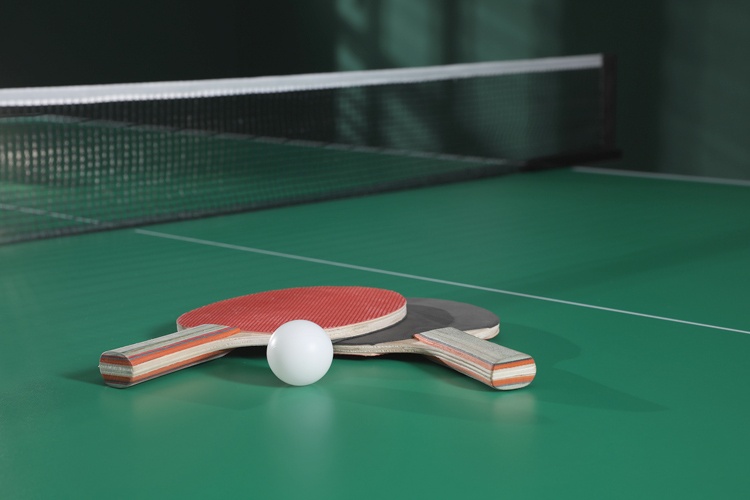Table tennis has been around for a long time. British soldiers and aristocrats played it, and it is now an official game in the Olympics. If you call it Ping-Pong, however, you should know you’re using a registered trademark.

First Came Tennis
Before there was table tennis, there was court tennis. There’s evidence that people played some form of tennis in prehistoric times. Sometimes called the “sport of kings,” tennis was a popular game among European monarchs. King Henry VIII was an avid player who installed a tennis court in his palace at Hampton Court.
In the 19th century, table tennis became a very popular substitute for lawn tennis, but there are conflicting stories about where it began. Some historians say it started among British soldiers stationed in India, who passed the time hitting small balls back and forth using pieces of wood as paddles and corks as balls.
A Fashionable Game
The game made its way to wealthy people on estates, who played table tennis the same way the soldiers did. They piled books on a table to serve as nets and used cigar boxes to flip champagne corks back and forth.
In 1890, an English inventor named David Foster filed a patent for a complete game set that included table versions of tennis, cricket and soccer. He received a U.K. patent for this set.
Names for the Game
During this time, people referred to the game as “whiff whaff” or “ping pong” because of the noise the balls made as they bounced off the table.
A year later, British manufacturer John Jacques & Sons registered the trademark for the name Ping-Pong. The company used this name on their boxed set that included wooden paddles, a light wooden ball, a net and a set of rules.
The Jacques company later sold the trademark to Parker Brothers, which was one of the biggest U.S. game companies at the time. In its long history, Parker Brothers created more than 1,800 games and toys, including Monopoly, Clue and Trivial Pursuit.
Official Organizations
Table tennis became even more popular with the arrival of Parker Brothers’ boxed sets. The game was inexpensive and easy to learn, but it also allowed skilled players to develop their own techniques. By 1920, tennis table tournaments were being held all over the world.
In 1927, Ivor Montague founded the English Table Tennis Association, which was one of the first professional table tennis organizations. The next decades saw the development of national and international table tennis associations. Many of them used the word Ping-Pong in their names, but after Parker Brothers enforced its trademark, they had to drop the word.
In 1971, the U.S. Table Tennis team traveled to China as part of a mission to build better relations between the two countries. The press dubbed the mission “Ping-Pong diplomacy.” Although China had been slow to adopt the game, the country quickly cornered the market on world championships for many decades.
Trademark Takeover
Escalade Sports, an Indiana-based sports equipment company, acquired the trademark to Ping-Pong in the 1970s. The company now licenses use of the term to other organizations that want to use Ping-Pong to refer to table tennis.
Some commonly used terms can lose their trademark status by becoming generic terms. This happens when a certain brand name becomes so closely associated with a particular product that people stop using generic terms for it. Some examples are yo-yo, linoleum and aspirin, which were all once trademarked and are now generic terms.
Is Ping-Pong a Generic Term?
This is known as “genericide,” and it’s the reason some companies with well-known brands routinely insist on asserting their trademark rights.
Escalade Sports, the current trademark holder of Ping-Pong, clearly considers Ping-Pong a trademarked term. The company website lists “genuine” Ping-Pong tables, paddles and game sets for sale with the slogan “The Original Since 1901.”
Protecting Its Trademark in Court
The company has also litigated to keep its trademark. In 2009, Sandman Table Tennis contacted Escalade Sports to request permission to use the term Ping-Pong to advertise its “World Championship of Ping-Pong.” Escalade gave the company permission to use the name if the trademark was used properly.
Shortly after reaching this agreement, Sandman then attempted to get its own trademark for the phrase “World Championship of Ping-Pong.”
Read more on common word trademarks.
Escalade Lawsuit
In 2011, Escalade Sports sued Sandman Table Tennis for trademark infringement. Escalade said Sandman had ignored the terms of the initial agreement and had no right to trademark any phrase with the word “Ping-Pong.” In fact, the U.S. Patent Office had already rejected Sandman’s trademark application on the grounds that it was too similar to the Escalade trademarks.
Sandman argued that Ping-Pong, like yo-yo and other terms that were once trademarked, should be considered a generic term for table tennis. The case was dismissed, and Sandman agreed to pay to license the term “Ping-Pong” from Escalade, but there was another twist coming.
Sandman Lawsuit
In 2014, Sandman sued the International Table Tennis Federation (ITTF) over its use of the phrase “World Championship.” Sandman argued that under its agreement with Escalade, it was alone entitled to host table tennis world championships.
The case was settled. The result is that Sandman can host its championships as official ITTF-registered events, but it cannot claim exclusive use of the words “world championship.”
A Popular Sport
Today, about 850 million people play table tennis. It is now an official Olympic sport and the national sport of China. There are American, European, Asian and world cups in the sport. If any of them attempt to use the term Ping-Pong, however, they can expect legal action from the trademark holder.

